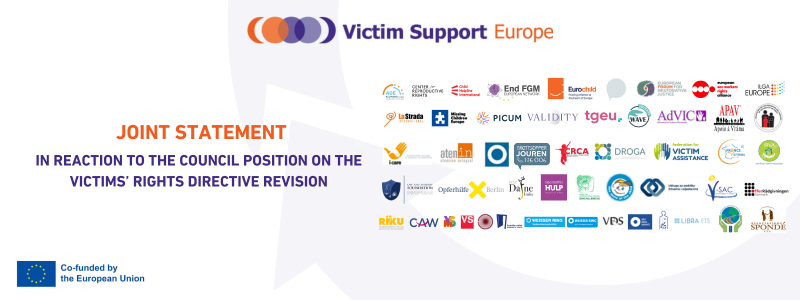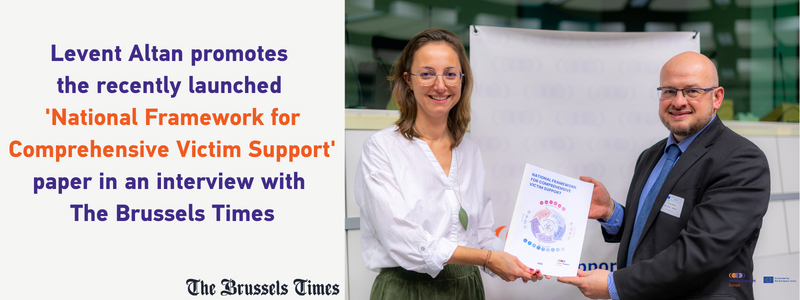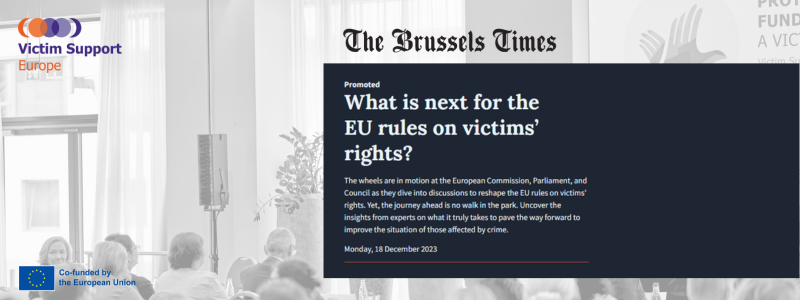Joint Statement in Reaction to the Council Position on the Victims’ Rights Directive Revision

On 13 June, the Council of the European Union adopted its position on the Commission’s proposal for a revision of the Victims’ Rights Directive. The European Parliament already published its negotiating mandate in April. More than twelve years after the adoption of the Victims’ Rights Directive, this was an opportunity for governments to stand in solidarity with all victims of crime and to strengthen their rights and treatment.
Regrettably, with this Council position, States have shown little willingness to commit to enhancing victim rights. They have largely rejected or diluted the EU Commission’s proposals, turning obligations into mere options. This undermines the scope of the Victims’ Rights Directive, leaving diverse crime victims inadequately protected and potentially harmed by the systems meant to protect them and deliver justice.
For example, specific rights have been removed or weakened, including those relating to safe reporting of crime, court-based support services, access to medical care services, privacy protections, information and participation rights, offender compensation, legal remedies and review decisions. Additionally, the role of NGOs has been diminished by removing commitments to coordinate services – which are largely delivered by civil society – to one of mere consultation. This increases the risk of further stigma, discrimination, or prejudice. Therefore, clear and binding obligations for EU Member States are essential.
This position of the Council contrasts with the European Parliament’s report, which has adopted proposals that build an effective legislative framework for coordinated support, protection and justice. Thus, the European Parliament recognises that the actions and costs involved in this process are investments in our future.
Every Euro spent on victims’ rights and services reduces the cost of crime and its emotional impact, and it also increases the ability of individuals to return to work, next to the efficiency and effectiveness of criminal proceedings. The European Parliament’s proposals commit to a thriving, safer, more resilient and more just society that upholds EU values, including fundamental rights.
Member States have recently adopted the Directive on Violence against Women and Domestic Violence, the recast EU Directive on Combating and Preventing Trafficking in Human Beings and they are currently negotiating the Regulation laying down rules to prevent and combat Child Sexual Abuse. This shows a willingness to seek the advancement of the rights of specific victim groups, with a particular focus on children, women and victims of human trafficking.
Member States should now affirm their commitment to all victims of crime regardless of their sexual orientation, gender identity, gender expression, sex characteristics, age, disability, ethnicity, residence status, and type of exploitation by enhancing minimum standards for all in the Victims’ Rights Directive Revision. There should be equal treatment of all victims of crime; no victim should be left behind.
With a new Parliament and renewed vigour, we call on all EU Member States and the European Parliament to stand together – united for every victim in the EU. We call on them to genuinely explore solutions proposed by the European Commission and Parliament that will finally make victims’ rights a reality. We call on them to honour commitments to victims of crime; by adopting a strong Victims’ Rights Directive as the cornerstone legislation for all victims of crime, Member States can demonstrate their commitment to valuing fundamental human rights, human dignity and the European Union’s foundational values.
Signatories
- AGE Platform Europe
- Center for Reproductive Rights
- Child Helpline International
- End FGM European Network
- Eurochild
- European Disability Forum (EDF)
- European Forum for Restorative Justice (EFRJ)
- European Sex Workers Alliance (ESWA)
- ILGA Europe (the European region of the International Lesbian, Gay, Bisexual, Trans and Intersex Association)
- La Strada International
- Missing Children Europe
- Platform for International Cooperation on Undocumented Migrants (PICUM)
- Validity Foundation
- Trans Europe and Central Asia (TGEU)
- Women Against Violence Europe (WAVE Network)
- Advocates for Victims of Homicide (AdVIC) Ireland
- A Associação Portuguesa de Apoio à Vítima (APAV Portugal)
- Association for the Prevention and Handling of Violence in the Family (APHVF/ SPAVO) Cyprus
- Associazione Italiana di Supporto Vittimologico
- Associazione Libra
- Associazone Spondé
- ATENIN Spain
- Bijeli Krug Croatia
- Bily Kruh Bezpeci (Czech Republic)
- Brottsofferjouren Sverige
- Child Rights Centre Albania
- DROGA Poland
- Federation for Victim Assistance Ireland
- France Victimes
- Irish Road Victims Association (IRVA);
- International Road Victims Partnership
- Klaipeda Social and Psychological Support Center
- Law and Internet Foundation (Bulgaria)
- Opferhilfe Berlin e.V.
- Rete Dafne Italia
- Slachtofferhulp Netherlands
- Skalbes Latvia
- The Smile of the Child – Greece
- Victim and Witness Support Service Croatia
- Victim Support at Court (Ireland)
- Victim Support Denmark
- Victim Support Finland (RIKU)
- Victim Support Flanders, CAW (Belgium)
- Victim Support Malta
- Victim Support UK
- Woman’s Room – Center for Sexual Rights Croatia
- Weisser Ring Austria
- Weisser Ring Germany
- Victimology Society of Serbia
- Vilnius Institute of Advanced Studies (VILIAS)
Read the PDF version of our statement here.
View our social media campaign visuals here.
Read our signatories publications – La Strada International, PICUM, Eurochild, Women Against Violence Europe.
Recommend0 recommendationsPublished in Uncategorised


